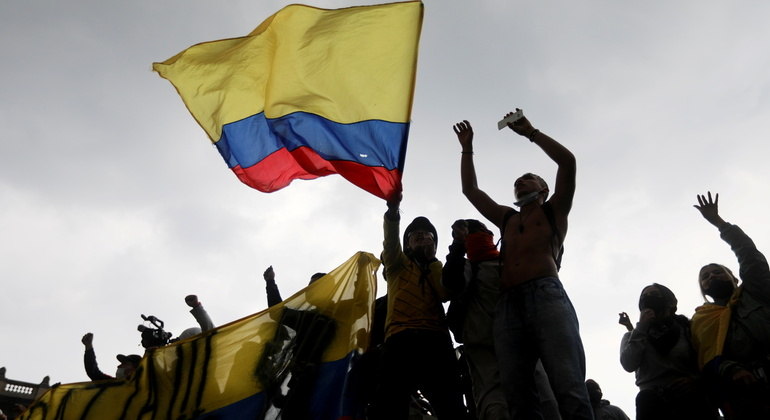RIO DE JANEIRO, BRAZIL – May has been the most lethal month for Colombia due to the coronavirus pandemic with nearly 15,000 deaths and more than half a million infected, even though vaccination is progressing and approaching 10 million doses applied.
The third peak, the most virulent and longest since the beginning of the health emergency, seems to have no ceiling as the daily figures of deaths and infections have not stopped increasing since last April.

Experts warn that Colombia could be going through an epidemiological plateau because of the figures accumulated since Easter, when thousands of citizens traveled and crowded in celebrations.
“We are seeing a plateau that is being prolonged,” said epidemiologist Javier Idrovo about the 500 deaths and 20,000 infections that have been confirmed daily on average in recent weeks.
BOGOTÁ, ON HIGH ALERT
The situation is critical in cities like Bogotá, which is approaching one million infections, and whose occupation of intensive care units (ICU) is close to 97%. In the city, 2,166 of the 2,235 beds available for patients with Covid-19 are occupied.
The Colombian capital remains on hospital red alert and has confirmed 958,281 infections -of which 65,084 remain active-, representing 28.3% of the cases reported in the country, which totals 3,383,279 cases and 88,282 fatalities.
“What we are seeing is the reflection of what was already coming from previous months, and I think what made the difference was the Easter vacations. Since that time, there was great population mobility between different regions,” added Idrovo.
Despite the increase in numbers, Bogotá authorities are preparing to fully reopen the city as of June 8, when both the nighttime curfew – currently in force between 11 PM and 4 AM – and the dry law will be suspended.
Although the measure may seem contradictory, experts are confident that with timely monitoring of virus transmission, the risks of the proposal can be minimized.
Although Idrovo warns that the total reopening of the city is a risk, he hopes that Bogotá “really intensifies public health surveillance” because “if it doesn’t, it could be more chaotic.”
“We would have been able to open earlier if we had had better public health surveillance work, better testing, faster diagnostic test results and that there was greater economic support for those who had to stay at home,” he explained.
PRESSURE ON EMERGENCY SERVICES
The Colombian Association of Emergency Specialists (ACEM) today alerted the Ministry of Health of a shortage of oxygen, medicines, and supplies for the care of critical patients.
According to ACEM, the pressure on Colombia’s healthcare system is greater in emergency services than in intensive care units, whose overall occupancy is above 95%.
Regarding this situation, Idrovo clarified that until there is no scientific evidence, it cannot be concluded that the increase in the figures is exclusively due to the massive protests in which tens of thousands of Colombians have taken to the streets of the country since April 28th.
VACCINATION REBOUNDS
Colombia has received 14.2 million vaccines against Covid-19 and has administered 9,825,772, of which 3,273,855 people already have the full two-dose scheme. Despite the slow start of the National Vaccination Plan, immunization figures have increased in recent weeks.
“It has improved in some regions of the country the disorder that there was at the beginning, especially in the first month and a half, but if we continue at a fast pace as we have seen in the last few days, we may improve this situation,” Idrovo explained.
The country will end May with 10 million vaccines applied, with those administered today, which marks an advance in the goal proposed by the government to immunize 35.2 million people this year.
“It still looks slow because we would always like it to be faster given that it is the form of protection that we see that can help us in the long term, but what I highlight about the plan is not so much the speed but the management of social equity that the government tried to apply since its original approach,” advanced the epidemiologist.
Of the vaccines applied, 1,933,607 have been in Bogotá, preparing to start vaccinating people over 50 years of age, after achieving good results with adults over 70 years of age, whose mortality from the disease has been reduced by 50%.
“It is clear that people aged 80 and over and people aged 70 and over, who before were the ones who were more complicated and lost their lives more, today percentage-wise are less in these aspects. This shows us that the vaccine works,” said today the Secretary of Health of Bogotá, Alejandro Gomez.

